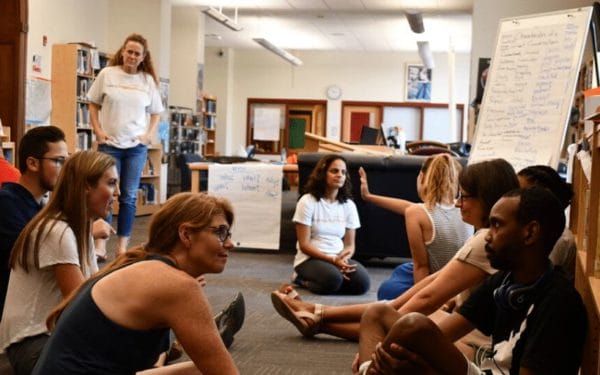By Jenna Fournel
During a workshop for Brown University’s Summer Institute (a virtual series of panels and lectures for students which alumni are doing in response to COVID19) our president and founder, Aleta Margolis, was asked to share her insights from 25 years as a leader of an organization working for change. We’ve pulled a few of the key ideas from her talk that might be useful for us all.
- If you are frustrated by the complacency of others, that’s the space where your energy is needed.
Aleta described how, as a new teacher trying and finding ways to reach all her students, she was frustrated by colleagues who accepted the status quo and seemed quick to give up on students who failed to fit the mold. As this frustration built, she realized that she could have an impact beyond her individual classroom if she worked with teachers to help them change their role from information provider to Instigator of Thought.
- Never stop being a learner.
Choosing to maintain an open mind is hard. As Aleta explained:
“It is very hard work to embrace a learning stance when times are painful and when assumptions are being challenged and broken apart. But it’s important and powerful work. It’s really important to approach life with curiosity and say, ‘I wonder how I can deepen my understanding.’ If you want to create change, curiosity and empathy should be at the base of all you do.”
- Listen, both to those who support you and those who do not.
“As the leader of an organization, it is my joy and responsibility to learn from everybody I interact with, and that includes people with whom I vehemently disagree, even if I have to seek those people out and read their words on social media or watch them on TV. Part of my responsibility as a changemaker is to bring my curiosity to understanding and listening to those who support me and those who really do the opposite,” Aleta explained.
Often in Inspired Teaching trainings we’ll reflect on this quote from the actor Alan Alda that beautifully describes what this kind of listening entails:
“The difference between listening and pretending to listen, I discovered, is enormous. One is fluid, the other is rigid. One is alive, the other is stuffed. Eventually, I found a radical way of thinking about listening. Real listening is a willingness to let the other person change you. When I’m willing to let them change me, something happens between us that’s more interesting than a pair of dueling monologues.”
- Be a scholar of the history of the thing you are hoping to change.
Anyone who joins the Inspired Teaching staff begins by reading through pages of organizational history because it’s important to know where we’ve come from in order to best contribute to where we’re going. This helps prevent repeating past mistakes, and develops an appreciation for the basis of the beliefs that have survived for 25 years. This same approach is critical for any movement to which you wish to belong. A thorough grounding in the past equips you with the understanding to change and contribute to the future.
- Change begins with finding common ground.
You can’t actually change the system or the things you’re hoping to affect by solely engaging with those who agree with you, so there will be many times when you have to engage with skeptics. We intentionally devote time in all Inspired Teaching trainings to building skills in this arena. And while the conversations and circumstances are all different, Aleta says that when talking with those who disagree with you, “find common ground. Engage from a place of empathy. Realize that at the core we probably want some of the same things.” Once you figure out what those “same things” are, you have a starting place for moving your conversations forward.
At the close to the workshop Aleta cautioned attendees to remember that the journey to success is never a straight and clean line.
“When successful people tell their stories, even when they’re telling stories of failure, sometimes they make it look easy. But I will say the messiness and the difficulty and the not-knowing-what-on-earth-to-do-next, is a very real part of the experience of leading a mission-driven organization. That uncertainty is a very real part of the journey and it just means you care and you’re trying hard. Frustration, failure, and challenge are a necessary part of growth. And if you let them, they can lead you to smarter, stronger outcomes.”

